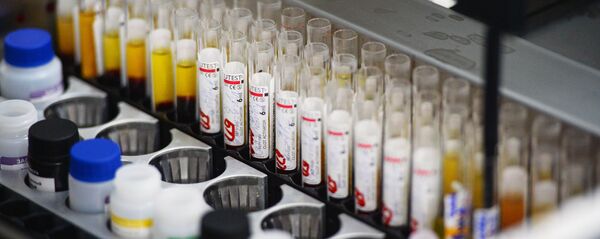According to the report, there were a total of 447,694 diagnoses of STIs in England in 2018, representing a 5% increase since 2017. In addition, the 26% increase in the number of cases of gonorrhea in 2018 (56,259 cases) is particularly concerning, given the rise in drug resistant strains of the bacterial infection.
"This is of concern given the three cases of extensively drug resistant Neisseria gonorrhoeae identified in England in 2018," PHE warned in its report.
Last year, PHE reported the UK's first case of "super gonorrhoea" in a man who contracted the disease while visiting Southeast Asia.
"It's different from gonorrhea, because it's not treatable with the antibiotics we currently use for treatment. And these are the only ones available for routine standard care; it seems to produce the same type of disease," University of Bristol scholar Paddy Horner told Sputnik at the time.
"So it seems to be the only difference is in the fact that we're not able to treat it with our current first line treatment," Horner said, describing the difference between gonorrhea and "super gonorrhea." Due to emerging strains of the bacteria, the US Centers for Disease Control and Prevention (CDC) recommends the disease only be treated with the antibiotic ceftriaxone, administered as an injection, in combination with one of two oral antibiotics, azithromycin or doxycycline.
According to the PHE report, the number of gonorrhea diagnoses last year marked England's largest annual number since 1978, "mostly due to increases among gay, bisexual and other men who have sex with men." The data also found that young heterosexuals aged 15 to 24, black ethnic minorities, and gay, bisexual and other men who have sex with men are the groups most impacted by STIs in England.
"The continuing escalation in gonorrhea and syphilis diagnoses must be addressed as an urgent health priority, otherwise there is the potential for devastating consequences to the wellbeing of the wider population and the health system as a whole," Dr. Olwen Williams, president of the British Association for Sexual Health and HIV, said in a statement to the Independent following the release of the report.
"Recent years have unfortunately, however, seen severe and damaging cuts to sexual health service funding, jeopardizing our ability to meet these challenges at a critical time," Williams added.
Chlamydia and gonorrhea are common sexually transmitted bacterial infections that often cause no symptoms. If left untreated, they can result in reproductive health problems, including pelvic inflammatory disease and infertility in women. Syphilis can also hijack the nervous system and lead to several serious symptoms, including difficulty coordinating muscle movements, paralysis, dementia and sensory deficits, according to the CDC. Syphilis is also caused by bacteria and can lead to very serious long term health issues, including brain disease and eventually death, if untreated. It increases the chances of acquiring and transmitting HIV.
"No matter what age you are, or what type of relationship you are in, it's important to look after your sexual health. If you have sex with a new or casual partner, make sure you use condoms and get regularly tested," Dr. Gwenda Hughes, head of STI surveillance at PHE, told the Independent.




